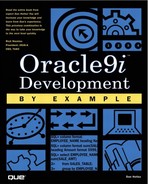SQL Coding Guidelines
Finally, we'll discuss some good and poor ways to code SQL statements. The following are some guidelines for SQL statement coding that will help both the rule-based and cost-based optimizers:
Do use the IN operator instead of NOT. Try to avoid using the NOT command by using >=, <=, and so on.
Do use array processing whenever possible (Export, and Pro*C applications).
Do use hints to ensure the desired execution plan results.
Don't use HAVING without a WHERE clause.
Don't use calculations in the WHERE clause on indexed columns. Unless the intended behavior is to disable index use, any function on indexed columns will ignore the index.
Don't use an index if more than 20% of the rows will be returned by the query.
Don't use subqueries if other solutions exist (PL/SQL loop, for example).
Don't write applications that use SQL execution plan defaults. Oracle Corporation makes no guarantees that default behavior will be maintained in future releases, or even between different hardware platforms.
NOTE
Array processing— A method in a C program to select groups of rows into the program over SQL Net; it's much faster than processing one row at a time.
